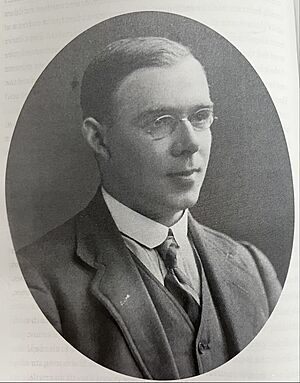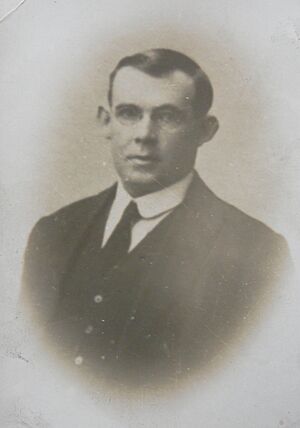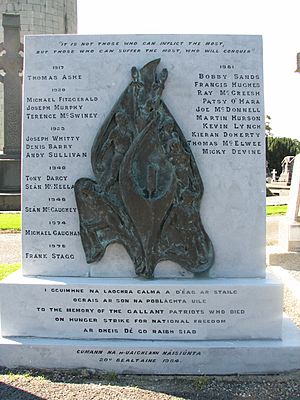Andy O'Sullivan (Irish republican) facts for kids
Andy O'Sullivan was an important leader and intelligence officer in the Irish Republican Army (IRA). He is remembered for dying during a hunger strike in prison in 1923. This happened during a difficult time in Irish history.
Contents
Who Was Andy O'Sullivan?
Andy O'Sullivan was born in 1882 in Denbawn, County Cavan, Ireland. He was the oldest of eight children. His family worked on a farm. Andy was very smart and won scholarships to study agriculture.
His Education and Career
Andy first went to Monaghan Agricultural College. Then, he earned another scholarship to the Royal Albert College in Dublin. He studied there from 1907 to 1909. He was one of the best students and even became the head of the student union. He also helped lead the college's hurling team, which was very successful.
In 1909, Andy became an agricultural instructor in Mallow, County Cork. His job was to teach local farmers new ways to grow crops and improve their farms. He also helped judge local farming shows.
Andy O'Sullivan and the IRA
Andy O'Sullivan was a dedicated member of the IRA. The IRA was a group of Irish people who wanted Ireland to be a fully independent country, free from British rule.
His Role in the Fight for Independence
Andy became a captain in the IRA's intelligence unit during the Irish War of Independence. This war was fought between Irish forces and the British from 1919 to 1921. Andy started his secret intelligence work in 1917, using the code name "W.N."
After the War of Independence, the Anglo-Irish Treaty was signed in 1921. This treaty created the Irish Free State, which was a new Irish government, but it still had some ties to Britain. Many Irish people disagreed about this treaty, leading to the Irish Civil War. Andy O'Sullivan joined the side that was against the treaty. He believed Ireland should be a completely independent republic.
Arrest and Hunger Strike
During the Civil War, Andy O'Sullivan was arrested by forces of the new Irish Free State government. He was held in Mountjoy Prison. Even after the Civil War ended in 1923, thousands of Irish republicans were still held in prison without a trial. They protested their imprisonment and the poor conditions.
On October 13, 1923, many prisoners in Mountjoy Prison decided to go on a hunger strike. This meant they would refuse to eat until their demands were met, such as being released or treated as political prisoners. Thousands of prisoners across Ireland joined this mass hunger strike.
The government had a rule against releasing prisoners who were on hunger strike. However, because so many people were involved, the government eventually talked with the IRA leaders.
Andy O'Sullivan died on November 22, 1923, after 40 days on hunger strike. He was 41 years old. He was one of three IRA members who died during the 1923 hunger strikes. His funeral was held in Mallow, County Cork, and was attended by a very large crowd.
Andy O'Sullivan's name is remembered today on a statue outside Cavan Courthouse.
Images for kids
 | DeHart Hubbard |
 | Wilma Rudolph |
 | Jesse Owens |
 | Jackie Joyner-Kersee |
 | Major Taylor |







